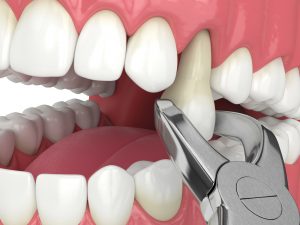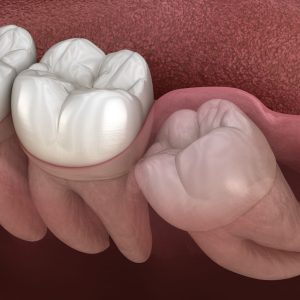How Removing a Tooth Might Protect Oral Health
Taking care of your teeth is essential for maintaining good oral health. However, there are instances when tooth extractions become necessary. Sometimes a tooth is too damaged to save, or you may be dealing with impacted or overcrowded wisdom teeth. The Farmington, NM dentists of Desert Hills Dental Care offer tooth extractions and wisdom teeth services as a way to care for your smile when certain teeth are causing problems.
What is Tooth Extraction?
Tooth extraction is a dental procedure in which a tooth is carefully removed from its socket in the jawbone, typically to resolve dental issues. Tooth extraction can be performed in two ways: surgical and non-surgical.
Non-surgical tooth extraction involves the removal of a tooth that is already erupted and accessible. It’s a less invasive procedure where the dentist uses dental instruments to gently loosen and remove the tooth from its socket.
Surgical tooth extraction refers to a dental procedure where an incision is made in the gum tissue, and if necessary, the tooth may be sectioned or bone may be removed to safely extract the tooth from the jawbone. It is typically performed for impacted or more complex tooth removal cases, such as impacted wisdom teeth.
What Are Wisdom Teeth?
Wisdom teeth, also known as third molars, typically emerge between the ages of 17 and 25. These are the last teeth to develop and are located at the back of the mouth. While some individuals have no issues with their wisdom teeth, others may experience problems due to various factors such as insufficient space in the jaw or impaction.
When a tooth fails to fully emerge or grows at an angle, it’s considered impacted. This condition can cause pain, infection, and damage to surrounding teeth. Wisdom teeth are particularly prone to impaction due to their location and late eruption.
Benefits of Tooth Extractions & Wisdom Teeth Services
Tooth extractions and wisdom teeth services can provide several benefits, including:
- Relief from pain and discomfort caused by impacted or damaged teeth
- Prevention of oral infections and gum disease
- Correction of dental alignment issues
- Preservation of overall oral health
- Preparation for restorative treatments like dental implants
- Potentially eliminating the need for more costly and invasive futures treatments
Who Qualifies for Tooth Removal
You may qualify for tooth removal or wisdom teeth services if any of the following apply to you:
- You’re experiencing severe pain or discomfort due to impacted or infected wisdom teeth
- You have crowded teeth or a small jaw
- You’re at risk of gum disease or tooth decay caused by the inability to clean or access certain teeth
The Tooth Extraction Process
Initial Consultation
Before you’re approved for tooth extraction, you’ll have an initial consultation with one of our Farmington dentists. During the initial consultation, your dentist will examine your mouth, review your medical history, and discuss your smile goals with you.
The information your dentist gathers during this visit will allow them to determine if tooth extraction is right for you and which kind of extraction you may need. Your initial consultation is a great time to ask any questions or voice any concerns.
Preparation
If you’ve been approved for tooth extraction, your dentist will prepare you by numbing the area with a local anesthetic. Once we’re sure you’re numb, your dentist will perform either a surgical or non-surgical extraction.
For non-surgical tooth extraction, your dentist will use a dental tool called an elevator to loosen the tooth and a pair of forceps to gently rock the tooth back and forth until it comes out. They’ll examine the area to ensure all parts of the tooth have been removed and there are no remaining fragments.
For surgical tooth extraction, your Farmington dentist will make a small incision in the gum tissue to access the tooth. Any bone that may be covering the tooth will be removed. Next, they’ll use forceps or a dental drill to loosen and remove the tooth from the socket. Stitches may be required to close the incision.
Tooth Extraction Aftercare
Aftercare following tooth extraction is crucial for proper healing and minimizing complications. Here are some important guidelines to follow:
- Take prescribed pain medications or over-the-counter pain relievers as directed by your dentist.
- Apply an ice pack to the outside of your face near the extraction site to reduce swelling and discomfort.
- Bite down on a gauze pad placed over the extraction site to control bleeding. Change the gauze as needed.
- Avoid rinsing or spitting forcefully for the first 24 hours after extraction to prevent dislodging the blood clot.
- Stick to a soft food diet and avoid chewing on the extraction site for the first few days.
- Gently brush your teeth while avoiding the extraction site, and rinse your mouth with a saltwater solution after 24 hours.
- Avoid smoking, drinking through a straw, or consuming alcohol for at least 24 hours, as they can interfere with healing.
- Maintain good oral hygiene by brushing and flossing gently, but avoid the extraction site until it has healed.
- Attend any follow-up appointments with your dentist to monitor the healing process and remove any sutures if necessary.
- Contact your dentist if you experience severe or prolonged pain, excessive bleeding, or any other concerns.
Frequently Asked Questions
No, not all wisdom teeth require extraction. However, if they’re causing pain, impacting other teeth, or leading to oral health issues, extraction may be recommended.
The extraction process is performed while the patient is under anesthesia, so you won’t feel any pain during the procedure. You may experience some discomfort during the healing process, but it can be managed with proper care and medication.
Recovery time varies depending on the complexity of the extraction and individual healing abilities. Generally, it takes about seven to 10 days for the extraction site to heal completely.
It’s important to follow your dentist’s instructions regarding diet after tooth extraction. Initially, a soft food diet is recommended, gradually progressing to a normal diet as the healing progresses.
Call Desert Hills Dental Care for Your Tooth Extractions and Wisdom Teeth Services
Tooth extractions may seem scary, but in the right circumstances, they can help preserve your oral health and prevent the need for more costly, invasive procedures down the line. If you require a tooth extraction or have concerns about your wisdom teeth, contact our Farmington, NM dental office by calling (505) 327-4863 or request an appointment online. Our experienced dental team is here to provide tooth extraction services to patients from Farmington and surrounding areas such as Bloomfield, Aztec, and Upper Fruitland, NM.
